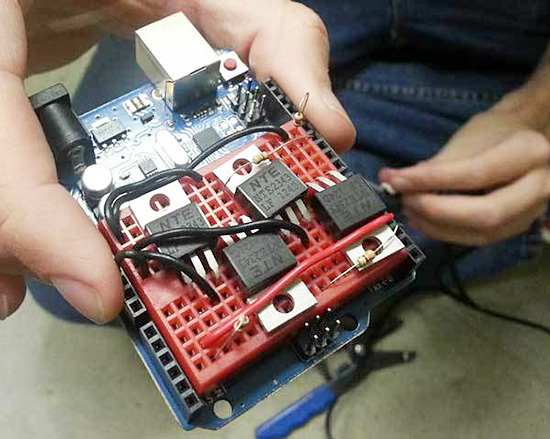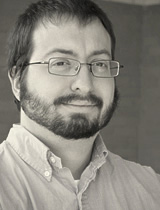
Students install wiring to an Arduino platform, a low-cost open-source computer designed to connect to a variety of sensors and other devices to interact with the physical world.
The Emerging Media And Communications program at UT Dallas aims to make students better “digital citizens,” even if that means stepping into the shoes of a computer hacker.
In the fall, Professor Andrew Famiglietti challenged his students to better understand the presence of the “hacker” in contemporary society, and to take a critical eye to the scholarship and practices surrounding the hacking subculture.
“People often use the word hacker to refer to a sort of digital thief, someone who breaks security with malicious intent,” Famiglietti explained, “but it can also refer to anyone who plays with technology in creative and unexpected ways.”
The goal of the class was to teach students how to both engage with technology in “hacker” mode and to show them how this method emerged over the course of recent history. The class blended readings with hands-on exercises.
“It was a humanities approach to a topic commonly seen as tech-only. The course also provided an in depth study for a broad topic,” said senior Will Parsons.

Dr. Andrew Famiglietti
During the first three weeks of class, students read academic research and journalism documenting the hacker subculture. These included Steven Levy’s Hackers, and selections from the more recent work of the anthropologist Gabriella Coleman. Based on these readings, students worked together to write collaborative research papers that captured the key principles of hacking as practice.
“To write their group papers, the students used a platform hosted by the Swedish Pirate Party, called piratepad,” said Famiglietti. “It’s the same site used by Anonymous and other hacker organizations to write some of their collaborative documents. I thought that was a nice touch.”
After establishing the theoretical frame of the course, the students turned theory into practice and began working with the Arduino platform, a low-cost open-source computer designed to connect to a variety of sensors and other devices to interact with the physical world.
“Arduinos were designed to be used by artists – you don’t need an engineering degree to learn how to code for one,” Famiglietti explained.
“People often use the word ‘hacker’ to refer to a sort of digital thief, someone who breaks security with malicious intent, but it can also refer to anyone who plays with technology in creative and unexpected ways.”
Dr. Andrew Famiglietti,
Emerging Media and
Communications Program
After an initial introduction to the Arduino, students participated in a weeklong exercise called “Arduino Chopped!” inspired by the Food Network game show “Chopped!” Students were given a random bag of electronic parts and asked to design and build devices using these parts and their Arduinos. The devices had to embody some aspect of the hacker principles they had learned.
“They really impressed me,” Famiglietti said, “they came up with some really creative devices in a short amount of time. One group managed to build a sort of self-driving toy car.”
Students spent the rest of their semester working on group projects employing the skills they had learned programming for the Arduino platform and the hacker principles. One group created an automated “noise music” installation that used the Arduino to trigger different sounds based on different hashtags used on Twitter.
“The group hoped to reveal something new about how people used Twitter, and remediate this experience in a novel way. It was a creative project,” Famiglietti added.
Located within the School of Arts and Humanities, the Emerging Media and Communication degree addresses the importance of understanding the social and cultural implications of an “always on” world. Through a range of disciplines including media studies, communication, psychology, art, history, writing, philosophy, and sociology, students will question the significance and impact of digital media on our major social structures and cultural institutions, working to understand how this affects what it means to be a citizen in the digital world.
Famiglietti holds a PhD in American Culture Studies from Bowling Green State University. His dissertation, entitled Hackers, Cyborgs, and Wikipedians, focused on the history and embodiment of Wikipedia.